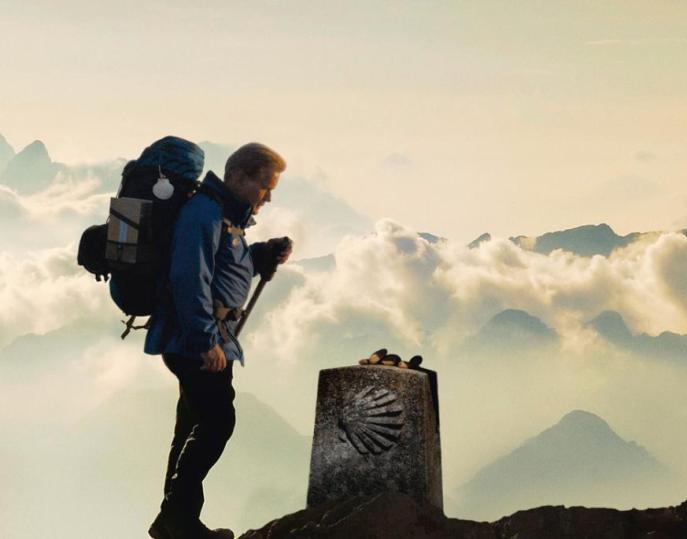Director: Emilio Estevez
Starring: Martin Sheen, Emilio Estevez, James Nesbit
UK Release date: 13 May 2011
Certificate: 12A (140 mins)
I confess at the outset of this review a decade-long bias towards anything to do with the Camino de Santiago de Compostela: as an energetic nineteen year old I cycled the way from Paris with two friends, and five months later, walked a shorter section of the route along northern Spain. I didn’t recognise at the time that what I was doing was a pilgrimage; but both trips have stayed with me through all the intervening years. Emilio Estevez’s The Way reminded me of many of the thoughts and people I came across: his film has a tender accuracy to it that may have much to do with the relationship with his father, Martin Sheen, whom he directs. Sheen plays Tom, an American who travels to the Pyrenees to bring home his son who has died on the first day of his pilgrimage to Santiago, only to find himself walking the way himself with his son’s ashes.
It’s the texture of life on the Camino that the film captures so well. After a few days walking, the brain fixes itself on a handful of obsessions: routes and beds, food and weather. Then the rating of the owners of the refuges – those that are out to rinse the last euro from tired pilgrims; the eccentric and the mad; the lonely; the generous who open up the door at night and cook a meal for soaked walkers. These topics act as passports into conversations with the strangers that you meet in the refuges, the same people that you will see on and off over the following weeks.
Although ‘the unlikely gang’ is a trope as old as cinema, Estevez sets up Tom’s travelling group with a lack of cliché that comes from the uniqueness of the characters. This is where the strength of the film lies: Tom, old and hurt; Sarah, lashing out in disappointment to find herself trying to escape her daily life and running into someone as predictable as another North American; the friendly and eager Joost; and the brilliant choice of casting James Nesbitt as a pretentious, solipsistic writer. Walking the Camino creates these communities bound together by chance – travelling at the same rate, with a limited number of places to stay each night – and these four characters feel like genuine strangers (the opposite end of the spectrum to the strangers-who-hate-each-other in predictable romances), annoying each other, gossiping between themselves, fluctuating between loneliness and wanting to be alone. Behind them lie the cast of any pilgrimage: the miracle-searchers, the adventurers, the self-seekers and world-changers, dreamers, those wishing for a revelation.
Any film that is so explicitly about ‘life’ and its changes runs the risk of falling into schmaltz: the slush of the easy-cure promises of self-change books, or Hollywood’s favoured romantic uplift. The Way steers clear of this almost throughout, despite a picaresque adventure with a gypsy family, and a few montages that feel like music videos (Alanis Morrisette and Coldplay provide the soundtrack: the film’s only acts of laziness). The counterbalance to any sentimentality is the character of Jack. Himself so ravenous and undignified in his search for a story, his spontaneous “that’s brilliant!” when he hears of the death of Tom’s son and Tom’s resultant quest: his character is the film’s awareness of its own complicity in simplifying the human story it tells, a tonic of irony that never overwhelms or dries up its earnestness.
But the journey remains, in Jack’s words, ‘a metaphor bonanza’, and hearing Sheen talk of transcendence before the film without either embarrassment or pretension, reminds me how serious a film it is. Pilgrimages, journeys, quests…these are the staple analogies in every life, capturing the pulse of aspiration, struggle, failure and achievement. The Way makes this explicit: all four pilgrims come bearing the hope that their journey will change them in some way. Film usually fast-tracks the gap between the experience and the meaning (to steal T.S. Eliot’s understanding) with the result that it rarely feels authentic: we don’t usually understand the significance of something till much later, and this understanding is never fixed, but shifts in emphasis and tone over time. I was reminded of Lost in Translation in the way that The Way handles its revelations – a refusal to bow to either melodrama or an ironic pointlessness, but finding a way of portraying the way people react to something they half-feel and half-understand. Here we see a flash of self-knowledge; a wordless moment of awe; and a settling in the self, which we might call happiness.
Nathan Koblintz
![]() Visit this film's official web site
Visit this film's official web site






